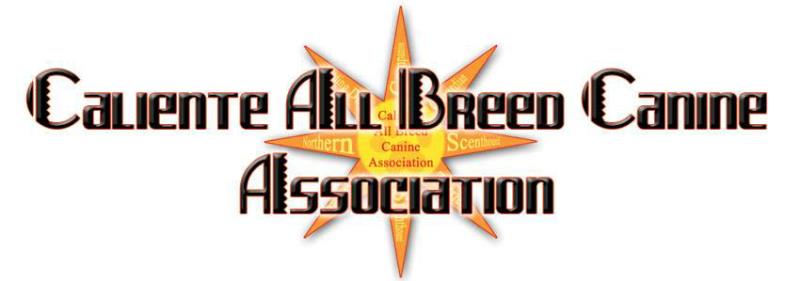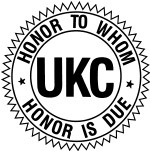
.What is the UKC?
The UKC was established in 1898 and is the largest all-breed performance-dog registry in the world. UKC prides itself on its family-oriented, friendly, educational events. The UKC has supported the "Total Dog" philosophy through its events and programs for over a century. UKC events are designed for dogs that look and perform equally well.
The programs at UKC include Obedience Trials, Agility Trials, Weight Pull Events, Terrier Races, Earth Work Events, Total Junior Program, Dog Sports (including Family Obedience), Coonhound Field Trials, Water Races, Night Hunts and Bench Shows, Hunt Tests for retrieving breeds, Pointing Dog Events, Beagle Events (including Hunts and Bench Shows, and Cur and Feist Squirrel and Coon Events and Bench Shows.
Rounding out the 'Total Dog' package, UKC Conformation Events are among our largest growing events. UKC dog shows are family events designed by and for the breeder-owner-handler. Professional Handlers are not eligible to exhibit dogs for others at UKC Conformation Events. At UKC dog shows, the emphasis is on the DOG, not the SHOW.
I am new to UKC, do you have any advice?
If you are showing UKC conformation for the first time it might be a good idea to watch the first show of the weekend. In any one weekend there can be up to six shows so you will have plenty of opportunity to actually show your dog. While it is not required most UKC handlers dress up to show conformation; some will go as far as suit and a tie but it is more common to see casual business attire. I tend to dress as if I am going to a job interview which is a pretty good rule of thumb. As with NKC your dog should be well groomed and in good physical condition. Your dog should be on a show lead with a chain or nylon slip collar; I have personal found the show chains with a short 2' lead to be the most effective when showing ABs. The collar should not draw any attention to itself as you want the judge be looking at your dog not its leash and collar.
A UKC multi-breed show will have many different and interesting breeds of dogs. Each breed is shown against itself with males going first from youngest to oldest. The best males from each age group are then shown against each other for Best Male. Then it is the females turn, each age group is shown and the winner from each age group is shown against each other for Best Female. Then Best Female and Best Male are shown against each other for Best of Winners. If there are Champions or Grand Champions of that breed they are shown and the winner of each class and the Best of Winners is shown in a class called Best of Breed. The Best of Breed class can have up to three dogs, the Best of Winners dog or bitch, the Champion class winner and the Grand Champion class winner. The winner of Best of Breed will then move onto the Group class. In the Group class each Best of Breed winner from all of the breeds in that particular group are shown against each other. For example American Bulldogs are in the UKC Guardian Group along with many breeds including Rottweilers, Doberman Pinschers, Dogo de Presa Canrios, Boxers and Mastiffs. The top dog from each of those breeds then shows against each other in the Group class; the group class will have several different breeds depending on which dogs are entered in the show. The judge looks at the dogs to determine who will be the Group winner. The Group winner will then move to Best in Show in which the winner of each group (Guardian, herding, companion, hound, etc.) will then show against each other; the winner of the that class will be awarded Best in Multi-Breed Show.
As dogs show and win the earn points towards a champion title. In UKC a dog must receive 100 points with at least three competition wins under three different judges. A competition win is a when a dog defeats at least one other dog and receives points. Once all of the Champion requirements are met then the dog becomes a Champion of record. The UKC also offers a Grand Champion title in which a Champion dog must win 6 Champion classes with at least three dogs competing.
What if my dog is not UKC registered?
If your dog is not UKC registered yet, but you have a UKC Permanent Registration Certificate or a UKC Application for Permanent Registration, you can easily registered your dog.
However, if your dog is a purbred dog but was not born in a UKC registered litter, you may single register your dog with the United Kennel Club. Dogs that are single registered with the United Kennel Club, must be registered with a UKC acknowledged registry, and show proof of such by submitting a copy of the Registration Certificate from that registry.
The owner of a single-registered dog has the same rights and privileges as the owner of a dog whose litter was UKC registered. Single-registered dogs may participate in any UKC licensed event for which the breed is eligible. A dog with a disqualifying fault, as determined by the applicable UKC breed standard, is ineligible for single registration.
UKC tailors the rules for single registration to the needs of each individual breed and takes into account the wishes of our individual national breed associations. Accordingly, the rules for single registration vary slightly depending on the breed of dog to be registered. If your dog is accepted for single registration, you will receive a registration certificate with a three-generation pedigree and Easy Entry™ card.
To learn more about registering your dog with UKC click here.
What if I don't have time to have my dog registered with UKC?
If it is too close to the date or you can not locate your dog's papers you can apply for a temporary listing number from UKC. This temporary number will allow you to compete and earn points for 60 days. You can obtain a UKC TL number by going to the UKC website. Many clubs including Caliente All Breed Canine Association also sell TL numbers at our events.
For more information about UKC Dog Events visit www.ukcdogs.com.
Glossary of terms on Entry Form: Click Here


